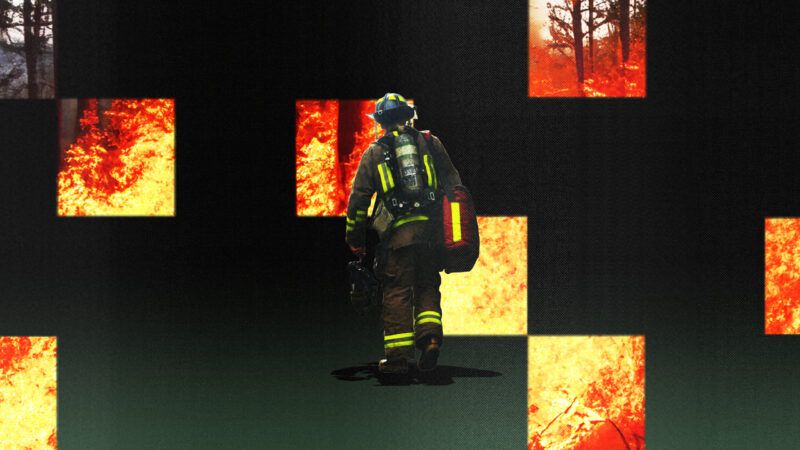In Defense of Private Firefighters
There's nothing wrong with offering to pay for a service people are willing to provide.

Not everything has been torched in the California wildfires. Some of those wealthy enough to do so invested in fire mitigation technology and hired private firefighters to preserve their property. Keith Wasserman, managing partner at Gelt Venture Partners, a real estate investment firm, sparked controversy when he offered to "pay any amount" to "private firefighters to protect [his] home in Pacific Palisades." Although he did not save his home, Wasserman has been called "incredibly tone deaf" for "hir[ing] private firefighters to risk their lives to save a home he most certainly has insured."
With so much destruction, the preservation of anybody's home or business—including through private firefighters—from the inferno should be celebrated, not condemned.
Wasserman wasn't the only person to call on private firefighters during the wildfires. Rick Caruso, billionaire and former real estate developer, succeeded in hiring "a private team to protect his Palisades Village shopping complex even as the immediate neighborhood around it was reduced to rubble," reports The Hollywood Reporter. The Getty Center has also used private means to protect its multibillion-dollar art collection and historical artifacts, investing in its own water supply, fire-resistant buildings, irrigation and air filtration systems, and landscaping.
Much of the public has reflexively critiqued the use of private firefighters by wealthy California residents. Arguments include the claim that "they compete with public teams for precious resources such as water" and "interfere with those teams' efforts," reports the San Francisco Chronicle. Joe Torres, the CEO of wildfire prevention and home hardening company All Risk Shield, denied the first claim, telling the Chronicle that "his teams primarily bring their own [water] to a site, or draw from homeowners' pools." Calistoga Fire Department firefighter Nathan Bowyer substantiated Torres' account, telling the Chronicle that private teams "have been nothing but helpful…particularly when they supply water tenders—massive vehicles capable of carrying large amounts of water to fire sites," which don't draw from public hydrants but contribute water to fire sites. Moreover, private firefighters have been legally required "to coordinate with public fire agencies' incident commanders during wildfires" in California since 2018, explains The New York Times.
Still others believe that private firefighters should not be financially incentivized to put themselves in harm's way. But firefighting is not the only job that entails appreciable risk; people who work dangerous jobs in commercial fishing, hunting, and roofing are well compensated for assuming such risk. These workers are not forced into these jobs but choose them, balancing risk and reward in a way that satisfies their professional preferences. It's not disrespectful to offer a construction worker a wage to repair a roof. Likewise, offering to pay firefighters "any amount" for their service, as Wasserman did, signals respect for them and the valuable, dangerous service they provide.
Private firefighting is not even a new kind of dangerous job; it predates the founding of the United States. In 1736, Benjamin Franklin formed the Union Fire Company, "a volunteer organization, independent of the city government," that served Philadelphia until the founding of the Philadelphia Fire Department in 1870.
Nor are private firefighters merely a relic of history. Deborah Miley, executive director of the National Wildfire Suppression Association, tells The New York Times that "45 percent of all firefighters working in the United States today are employed privately."
The devastating Los Angeles fires dramatically increased demand for fire-protection services overnight while supply remained relatively static, significantly increasing their price. What's wrong with a private firefighter? Not their existence, but their scarcity; if only there were more of them at the time of the fires, more residents could have afforded to contract their services and protect their homes.


Show Comments (8)